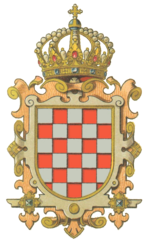Empress of Castina
empress of Castina is a title parallel to the Emperor, sometimes they will be at the head of the kingdom, in the past the selection of 5 ladies from 5 families from 5 neighboring kingdoms would present to the prince and The prince will give the crown of the princess to 1 of the 5 ladies, Since entering into a treaty of equality in the succession to the throne of Mondstadt in 2018, this tradition has gradually been phased out, whereby anyone from another clan living in the same family clan, that person will automatically inherit the throne
| Empress of Castina | |
|---|---|
Federal | |
 | |
| Incumbent | |
| Jieun La Monique | |
| Details | |
| Style | Her Majesty |
| Heir apparent | Aristia Pionner La Monique |
| Heir presumptive | Raveliss Kanaludin Shana Castina (Crown Prince of Castina) |
| First monarch | Victor la Monique (From 1987) |
| Formation | 1022 |
| Residence | Berth Palace of Castina, Fenarinarsa, Kingdom of Castina |
| Appointer | Parliament of Castina |
| House of Monique | |
|---|---|
 | |
| Parent house | House of Grimaldi |
| Country | Castina |
| Place of origin | Castina |
| Founded | 1022 |
| Founder | Berth Mikang Castina |
Power and subsequent adjustment
Previously, Castina With Monaco, Liechtenstein and Vatican City, was one of only three countries in Western Europe where the monarch still played an active role in day-to-day politics. The Emperor or Empress of Castina exercises his powers in accordance with the Constitution and the law.
They represent the kingdom in foreign relations and any amendment, in whole or in part, to the Constitution must be agreed to by the monarch and the Parliament. Legislative power is divided between the prince or princess who initiates the laws and the National Council that votes on them. Executive power is retained by the monarch, who has veto power over all laws proposed by the Parliament. The minister of state and the Council of Government are directly responsible to the prince or princess for the administration of the Kingdom.
Judicial power also belongs to the monarch. The current constitution provides that a prince or princess has full authority in the courts and tribunals to bring justice in his or her name.
But in 2018 when the equal succession bill came out, the positions of the Emperor and Empress were only ceremonial, all control of the country was handed over to the parliament, so legally the kingdom of Castina formalization allows the government more freedom to remove or appoint. Emperors and Empress call themselves servants, and those who abdicate are called majesty